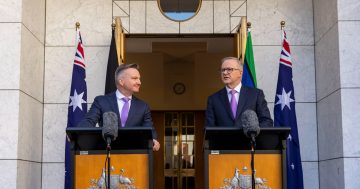Patrick Wright* says comparison websites aren’t all there cracked up to be and presents better options.
 If you’ve ever tried to compare insurance, energy plans or hotels, you have likely come across a commercial comparison website.
If you’ve ever tried to compare insurance, energy plans or hotels, you have likely come across a commercial comparison website.
On the face of it, these services seem great — they save time and are easy to use.
These days, there are comparison sites available for just about any product or service you can imagine.
What you might not know is that:
- These websites often receive commissions from the products they recommend.
- They may not list all the options — including those that might be the best or cheapest for you.
- Some of these comparison sites, like Compare the Market, are owned by companies that also sell insurance and other products.
- These business have often found themselves in hot water with Australia’s consumer watchdog.
Just last year, iSelect was ordered to pay $8.5 million in fines for misleading customers using its electricity comparison service.
The ACCC says the company’s conduct “may have caused some customers to switch electricity providers or plans on the basis of a price that was understated or without being aware that a cheaper plan was available”.
Since 2014, the ACCC has also taken action against Trivago and Compare the Market for misleading and deceptive conduct.
Jonathan Brown, a consumer advocate at Choice, says the reality is these commercial websites are driven by “making a sale”.
“The first thing to consider is whether [these sites] are actually going to help you make a comparison at all,” he says.
“It’s much more important to get independent advice.
“And you can’t say the commercial sites are independent. They are there to sell.”
What happened when I used these sites to compare electricity deals
I wanted to find out more about how these services worked.
So, I decided to use three different services — Compare the Market, iSelect and Finder — to compare energy offers available for my home address.
All three services had disclaimers.
Compare the Market’s terms and conditions mention “the energy plans compared … are not representative of all energy plans available in the market”.
iSelect’s website mentions it “does not compare all energy providers or plans in the market” and that “not all plans made available from iSelect providers are compared by iSelect”.
“iSelect’s energy comparison service is provided free of charge to customers, many of whom value the convenience of not only being able to compare a range of products but also fully complete the switch process through the service should they decide to change providers,” an iSelect spokesperson told ABC Everyday.
Finder mentions in its documentation that “we don’t compare all products, but we’re working on it”.
In a statement to ABC Everyday, Finder’s chief executive Chris Ellis said: “Currently our energy comparison platform prioritises relevance over price, with the relevancy ‘score’ taking into account factors such as popularity, fees, flexibility and green options.”
“We are constantly reviewing our offering across all our comparisons and will continue to incorporate customer feedback to ensure we always deliver on providing a seamless switching experience.”
To get a baseline, I used the Victorian Government’s energy comparison service, Victorian Energy Compare, which listed offers from 27 different energy providers.
So how did the commercial comparison sites compare?
- Compare the Market returned 17 offers from 12 providers.
- iSelect only listed 12 offers from seven providers.
- Finder listed 14 offers under the default setting, which only included partnered products.
When I unticked that option, I got another 14 results, with different plans and providers.
- Importantly, the cheapest listed product on Victorian Energy Compare didn’t appear on any of the commercial comparison sites.
The free, government comparison sites for energy and health insurance
To make sure you are getting the complete picture, it’s a good idea to use one of the government-run energy comparison sites.
- Energy Made Easy (national)
- Victorian Energy Compare (Victoria)
If you’re comparing health insurance products, keep in the mind there is also a free government-run comparison site that you can use.
Why it’s important to read marketing claims carefully
Commercial comparison websites often use sophisticated tactics and careful language in their marketing material.
For example, a comparison site may promise to offer a “great deal” rather than the “best deal”, Mr Brown says.
“One example we’ve seen, when it comes to health insurance, there’s more than 30 different health funds, and some of the commercial sites compare as few as seven,” he says.
“That’s one example, where you can see they’re really not offering much of a comparison at all, but their marketing is really great at hooking you in. It’s another reason not to go with the first thing you see on Google.”
Commercial comparison sites can also have financial interests in the services they recommend.
Compare the Market, for example, is part of the global BHL Group. BHL also owns Auto and General Insurance, the company responsible for a number of popular insurance brands including Budget Direct.
So why does this matter?
Well, if you read the terms and conditions of Compare the Market’s car insurance service, you will find six of the 12 compared brands sell policies “arranged by” and “on behalf of” Auto and General .
“Some products from related entities are available through Compare the Market, and customers can choose to purchase them if they wish,” Compare the Market said in a statement to ABC Everyday.
“Compare the Market does not order its products based on its commercial relationships with retailers: rather, we find products that meet each particular customer’s needs, and then we display them from lowest to highest price.”
An ACCC spokesperson told ABC Everyday: “Comparator website operators who order results based on their commercial relationships and are not upfront and clear with consumers about this will likely be in breach of the Australian Consumer Law.”
Other things to keep in mind
Many of these comparison sites also produce educational content, like articles and videos.
These articles and videos can appear independent, but they’re really just another form of marketing, Mr Brown says.
“When commercial comparison sites are producing content, they’re producing it so you will buy the product. They’re not producing it to educate you,” he says.
If you’re looking for advice about financial issues, there are plenty of independent sources available, such as ASIC’s MoneySmart.
Finally, Mr Brown warns against giving your phone number to commercial comparison services, as you it could lead to sales calls.
“Phone calls in particular are one of the worst ways that people get tricked into buying products they don’t need or products that aren’t suited to their needs,” he says.
“Any true comparison service should provide that service in a way where you’re comfortable and you’re not feeling pressured.”
Tips for using comparison websites from the ACCC
- Have a thorough look on the website before you start comparing to check for any disclosure of third-party commercial relationships.
If you’re unsure about the existence of any commercial relationships, you can call the operator and ask.
- Remember that a comparator website may not compare all the offers in the market.
- Some operators use your information for purposes other than comparing products.
Make sure you are comfortable with how your data will be used.
- Comparator website operators may be considered misleading if they omit to display (or incorrectly display) relevant information and are not transparent about commercial relationships.
- Keep a record of any phone calls, and don’t be pressured to make a quick decision. Ask for written confirmation of any offers.
*Patrick Wright is a contributor at the ABC.
This article first appeared at abc.net.au.










